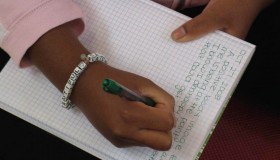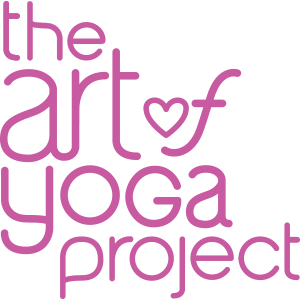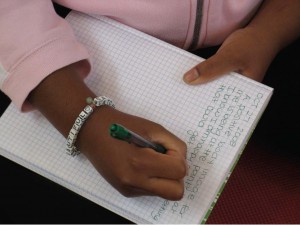The Power of Questions

When I started teaching writing with the Art of Yoga Project in July 2014, I told the girls in detention to think of writing as yoga for the imagination. Writing, I told them, stretches our ideas, stretches how we imagine ourselves and how we think about our world. And it’s fun: on the page, anything goes.
Like yoga, expressive writing is therapeutic for people of all ages who’ve experienced trauma – which consistently 95 to 99 percent of girls self-report experiencing prior to their entry into the juvenile justice system. Their trauma may be sexual, physical or emotional abuse, exploitation, or even prolonged neglect. Finding language for traumatic experiences helps victims process their memories, and begin to heal.
This week’s class at Santa Clara Juvenile Hall was a good – and playful – example of how this emotional processing takes place, and how girls in juvenile detention face far different challenges than girls their age who have lived without trauma, yet have so many similarities.
Our project focused on questions—because, as I suggested to them, knowing our questions is just as important as knowing our answers, and sometimes even more so. My co-teacher, Julie Wool, started by centering and grounding the girls with a short yoga sequence, and then I shared a quote from Rainer Maria Rilke:
“…Have patience with everything that is unresolved in your heart and try to live the questions themselves as if they were locked rooms or books written in a very foreign language. … Live the questions now. Perhaps then, someday far in the future, you will gradually, without even noticing it, live your way to the answer.”
“That’s deep,” one girl said, and asked for an extra piece of paper to copy it down.
Then we talked about questions, the questions that shape our lives now and in the future. Who tells us who we are? Where do we want to go with our lives? How do we want to get there? I invited them to write down absolutely any question they had, on any topic. I offered some prompting, such as: Consider the things that feel uncertain in your life. Consider the things that influence you, and why. Consider the mysteries of your life, and why they are important to you. Then, imagine there was a source for all the answers. What questions would you ask? Write down as many questions as you can think of. Don’t worry about the answers.
The girls had amazing responses. Some wrote questions about god and aliens and life and the afterlife. One girl wrote, “Why is the devil a fallen angel?” Many wrote the whys of the future and past, their families, and their relationships. Some wrote questions about their bodies like, “Your nails – what is that white dot that can be there?” and “Why wasn’t I an animal? Like a cat, dog, fish or pig?” They had a lot of fun with each other’s ideas (“That white dot means someone is thinking about you.” “You would have been eaten if you were a pig!”). Even those who didn’t write much enjoyed the discussion, with me encouraging them to “put those words on paper!”
I told the girls to notice how our questions connect us, that many of them wrote similar or even identical questions, or when they heard someone’s question called out, “Yeah, I want to know that too!” A big part of the discussion was letting go of the need to have answers, to stand with the mysteries and embrace “the questions themselves” as Rilke wrote. One girl said she liked the idea of “living your way to the answers” without trying.
Two girls were moved to dive deep for this project, and wrote questions that, when read together, had the qualities of rhythmic poems and personal stories. Woven together, their questions even seemed to hold answers.
Questions by “C”
Everyone has a purpose in life, what is mine?
Why couldn’t I have blue eyes?
Why does the “higher” people hide things from us?
Isn’t this a free country? But yet there’s so many rules.
If there’s a god and when we die there’s a heaven and a hell, then how come we see ghosts on earth?
When and how will I die?
How would it be if we choose our family?
When will I get out?
Why can’t we have three wishes in life?
Why are alcohol and drugs legal, but yet they can kill you?
Why can’t we choose our life?
We can’t we read people’s minds?
Why can’t we have super powers?
How can a female give birth to another human?
How come my pencil isn’t sharp?
Why was I born a girl?
Why can’t I know what I know now?
Why can’t I restart my whole life?
How can people believe in something they can’t see?
I wonder what I look like from my enemies’ eyes?
Questions by “S”
Why do we have the lifestyles we have? Why can’t we choose our life? It’s like everything was made for us, without consent. When we’re born I feel like God already knew our choices we would make to this day.
Why are we who we are? Why am I the daughter of ____? Why did my mom marry my stepdad ____? Why did my stepdad beat and abuse me? Why are some people immune to physical, verbal, emotional and mental abuse? Who taught us the wrong ways in the world?
What’s the point of love? Why do people cheat, lie, and hurt others? What’s the point of falling for someone who won’t always be there for you when shit happens? Why can’t I be as happy as everyone else?
Why does the good die young? Why do we all end up having to say goodbye? Why did god create a time in their life when we eventually leave? Will we all go to heaven? How will I die? Car accident, shooting, overdose, beat to death, or will I just die old? Why do people judge and discriminate? Why do people look to god when they are in trouble, but not just any day? Why do people expect the higher power “god” to answer all their prayers?
Why doesn’t my mom understand me? Does she really care? Why do we keep making the same mistakes, knowing we weren’t happy the first time we made them? Why was I born?
Where did the human race begin? When my time comes will god forgive me from all my sins? Will he accept me? Will I be loved? Why do we die?
Writing about trauma isn’t easy, and as a teacher it can be heartbreaking to witness. My co-teacher and I both give the girls a lot of feedback as they’re sharing—not just compliments, but responses that reflect our understanding and empathy. I always offer to type up the girls’ work and bring it back to them, which helps them to realize that what they’ve expressed is important, that it’s being held safely, that it’s worth keeping – and, like them, should be treasured.


